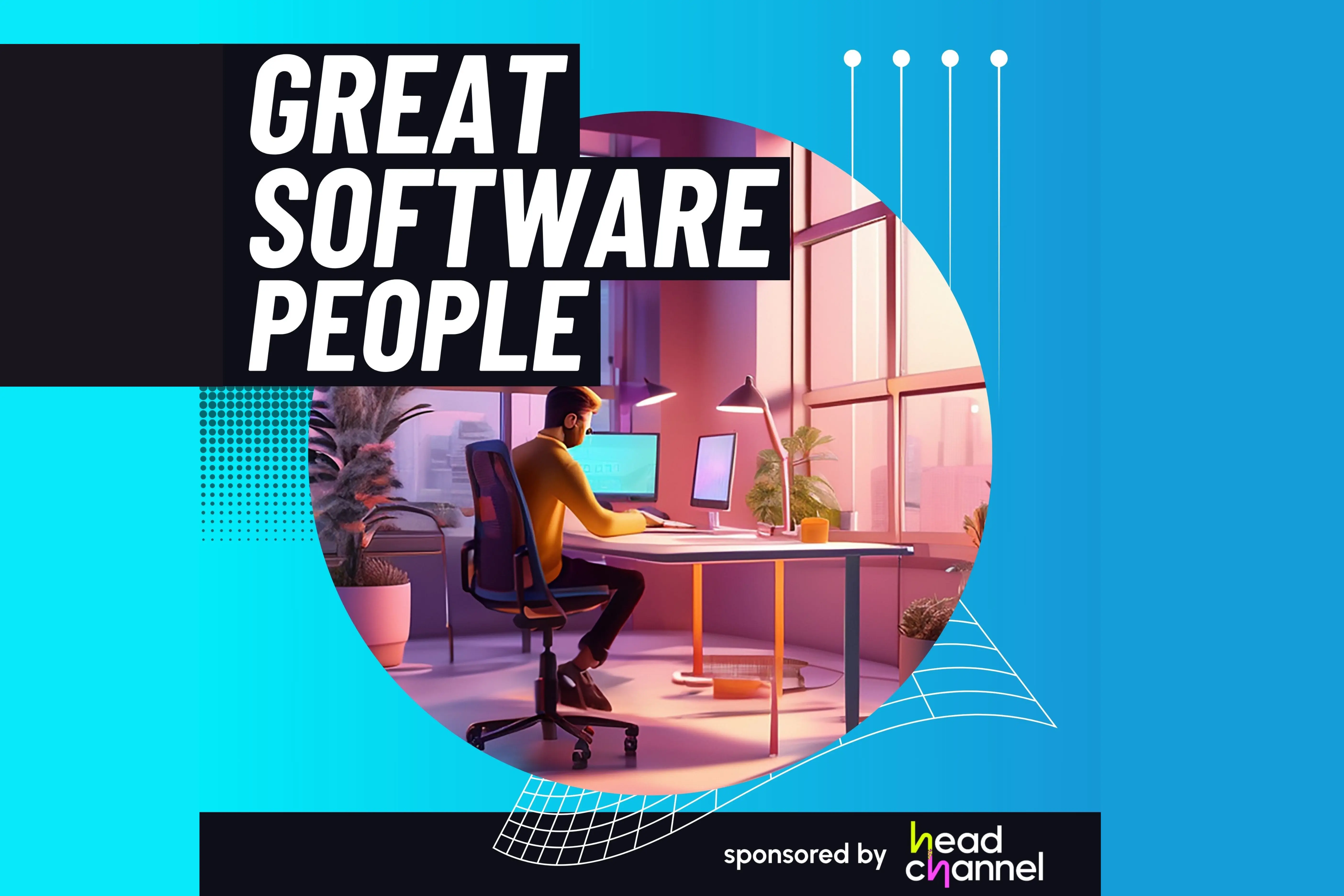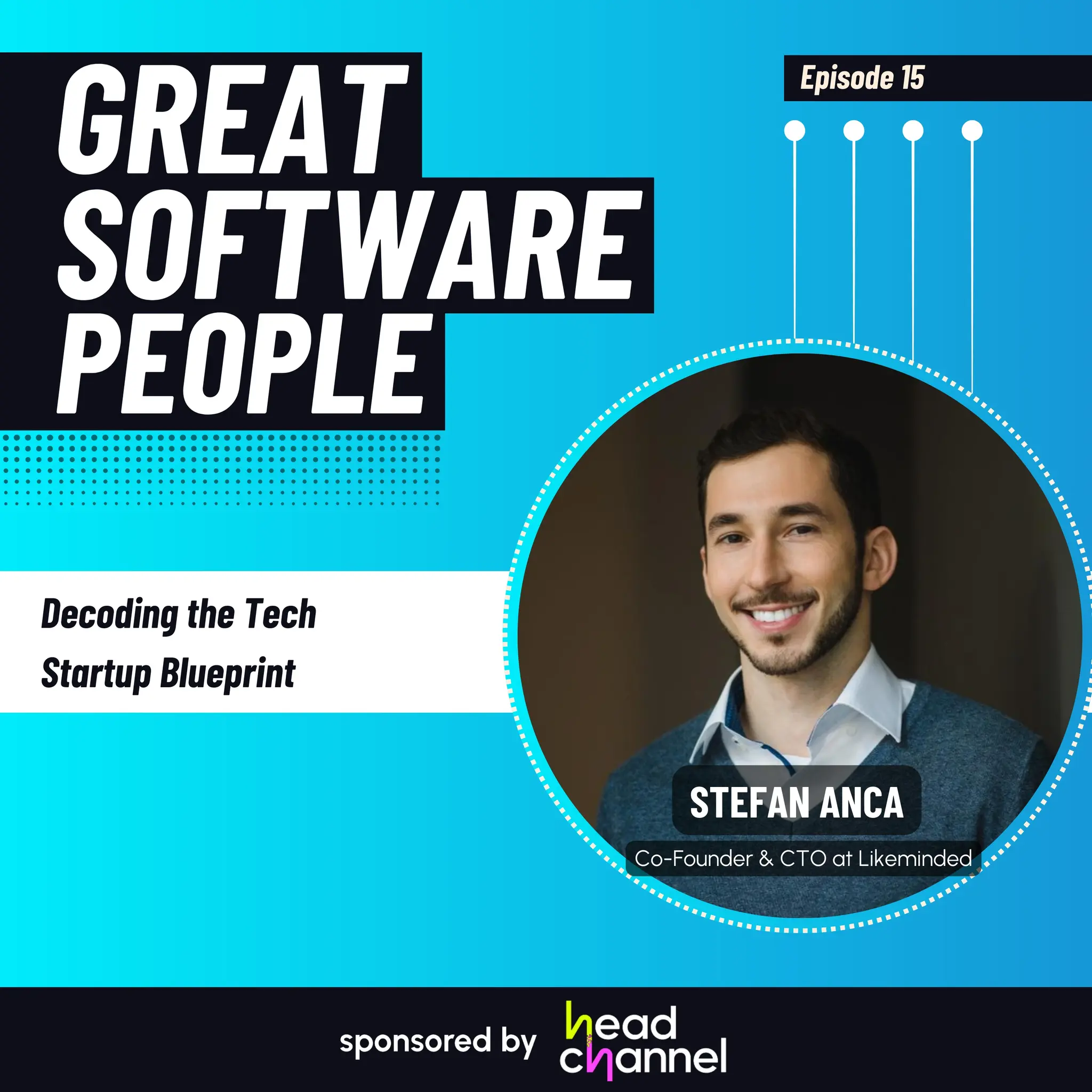
Decoding the Tech Startup Blueprint with Likeminded Co-Founder & CTO, Stefan Anca - Episode 15
What makes a tech startup shine?
The unique nature of each startup demands empathetic leadership of a CTO, something which Stefan Anca exhibits in abundance, having Co-Founded the Berlin-based mental health platform, Likeminded.
Join us as we learn from his invaluable experiences, evolving from mobile development through to a resilience-building Founder’s journey, and peer into the AI-enabled future that promises to redefine software development…
This episode covers:
-
Stefan’s core beliefs for the best approach to people management
-
How leaders should tweak their strategy between unique startups
-
The power of Stefan’s core belief in empathetic leadership
-
AI’s transformation of the software development role as we know it

Episode highlights
“I decided to move to Berlin, mostly because that’s where all the mobile development jobs were. But also because I wanted a bigger city. And I wanted to be part of the startup scene. ” - 6:20 - Stefan Anca
“Leading a team is all about understanding, building personal relationships, and helping connect people with each other - that’s my core belief in people management.” - 12:40 - Stefan Anca
“No two startups are the same. Every constellation of people have their own challenges and processes that make them work.” - 22:45 - Stefan Anca
“The future of software development will include AI in some form or another - it changes the definition of a software engineering role.” - 27:30 - Stefan Anca
LISTEN HERE:
[00:00:13]
Rich: Welcome to another episode of Great Software People! Today, I’m joined by Stefan Anca, the former Co-Founder and CTO of LikeMinded, and someone who’s currently gearing up for his next adventure. Welcome, Stefan!
Stefan: Thank you! I’m really happy to be here and to chat with you today.
[00:00:40]
Rich: Let’s start with the classic question I ask all my guests: when you were growing up, what inspired you to pursue software?
Stefan: Great question! As a kid in the 90s, I was fascinated by computers—mostly because of games, of course. But I loved the idea of programming my own games. That’s how my interest in computers and coding began.
[00:01:23]
Rich: So when did you first get your hands on a computer?
Stefan: My family got our first computer when I was 14. I spent hours playing games, but my real interest in programming started around 15 or 16 when I joined a high school that taught programming. That’s when I started experimenting with languages and building simple games like tic-tac-toe.
[00:02:00]
Rich: And then you went to university?
Stefan: Yes. In 2004, I left Romania for Germany, where I studied electrical engineering and computer science for my bachelor’s. I later pursued a master’s in smart systems, focusing on AI, robotics, and natural language processing (NLP). My bachelor’s and master’s theses were both on NLP, which was a big area of interest for me at the time.
[00:02:40]
Rich: What happened after university? Did you jump straight into a job?
Stefan: I had three internships during university, all in different areas: web development in Bucharest, Python programming in a U.S. research agency, and an early startup experiment with friends. After we decided not to pursue the startup, I started my first full-time job in 2009, working for a family-owned company in Bremen. We developed software for the automotive manufacturing industry—mostly using Python and JavaScript.
[00:03:55]
Rich: And that’s when you started thinking about Android development, right?
Stefan: Yes, around 2012. I taught myself Android programming and Java in my free time. My first project was an app for children that used flashcards to teach words based on the alphabet. To learn, I even built an app for a U.S. company almost for free. Once I felt confident, I applied for jobs as an Android developer.
[00:05:12]
Rich: What came next?
Stefan: I moved to Berlin to join the startup scene. I started at a venture builder as a backend engineer, then transitioned to Android development. One of the projects I worked on was a VPN product, which became my first real experience scaling a startup.
[00:07:04]
Rich: What did you learn from scaling that company?
Stefan: A lot. I saw the challenges of growing a team from a handful of employees to 50 within 18 months. What worked well was how we inspired engineers by offering a meaningful mission—like providing free VPN services to journalists in Turkey. But I also learned lessons about people management. I saw some senior leaders struggle to treat people well, which shaped my own approach to leadership.
[00:09:20]
Rich: After the VPN startup, you moved into freelancing?
Stefan: That’s right. I freelanced for about a year and a half, working with both startups and corporates. But I missed the sense of community I’d had at university. I realized I wanted to build my own team and eventually become a CTO. To gain leadership experience, I joined Boston Consulting Group Digital Ventures (BCG DV).
[00:10:32]
Rich: How was your experience at BCG DV?
Stefan: It was transformative. I started as a senior engineer and was later promoted to lead. I managed teams, learned people management, and even developed consulting skills like building presentations. I also discovered my passion for building teams and helping individuals grow in their careers.
[00:13:19]
Rich: What types of projects did you work on there?
Stefan: We built startups for large corporates that couldn’t innovate internally. This involved creating MVPs, hiring teams to take over, and then handing off the business. It taught me how to build products for others, keeping future handovers in mind from the start.
[00:15:26]
Rich: After nearly four years at BCG DV, you decided to co-found LikeMinded. What drove that decision?
Stefan: By 2020, I felt ready to take on the CTO role. LikeMinded was born out of a shared vision to address mental health in the workplace.
[00:16:26]
Rich: Tell us more about LikeMinded.
Stefan: LikeMinded is a B2B platform offering mental health services to companies. Employees get access to psychologists, workshops, and digital tools to manage stress and prevent burnout.
[00:17:54]
Rich: How did you approach scaling the company?
Stefan: Initially, we started as a B2C platform but pivoted to B2B within a year and a half. Scaling the team was a slow, deliberate process. I had to balance hiring with budget constraints, convincing talented individuals to join a young startup with limited resources.
[00:20:20]
Rich: How was being a CTO different from your previous roles?
Stefan: It was a massive shift. As a CTO, I was responsible not just for tech but also for recruiting, compliance, fundraising, and strategy. It was challenging but rewarding.
[00:22:03]
Rich: Any particularly stressful moments?
Stefan: Plenty. For example, our pivot from B2C to B2B involved intense discussions and strategic decisions. There were also difficult times when key team members left. It’s all part of the startup experience, but it’s not easy.
[00:24:11]
Rich: You recently left LikeMinded. What’s next for you?
Stefan: I’m focusing on AI. My goal is to deepen my expertise in generative AI and eventually launch a new startup that uses AI to benefit humanity.
[00:27:05]
Rich: Where do you see software development heading with AI?
Stefan: AI will definitely become an integral part of software development, acting as a powerful assistant. However, engineers will still need deep knowledge to review and correct AI-generated code. I do worry that this shift could lead to a proliferation of simple, poorly optimized code.
[00:30:01]
Rich: Any advice for aspiring CTOs?
Stefan: Set clear goals and seek out mentors who’ve walked the path you want to follow. Learn from them and be prepared to step outside your comfort zone.
[00:31:00]
Rich: Wise words, Stefan. Thank you so much for sharing your journey. It’s been a pleasure having you on Great Software People!
Stefan: Thank you, Rich. It’s been an amazing conversation.

Contact us.
If you need a partner in software development, we're here to help you.
We will respond to your enquiry immediately.